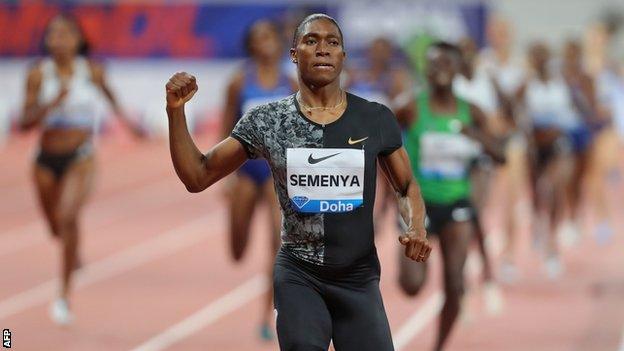Caster Semenya to miss World Championships after court ruling
- Published

Caster Semenya has been allowed to compete while awaiting the outcome of her appeal to a Swiss federal court
Caster Semenya says she will not defend her World Championship 800m title in September after a setback in her challenge to the restricting of testosterone levels in female runners.
But the South African said she would "continue her fight for human rights" despite her "disappointment".
Semenya has twice appealed against IAAF rules preventing her from running without medication.
But a ruling allowing her to compete has now been overturned.
Semenya is challenging new rules from the sport's world governing body, the International Association of Athletics Federations, that she and other athletes with differences of sexual development (DSD) must either take testosterone-reducing medication in order to compete in track events from 400m to the mile or change to another distance.
Semenya had been able to race while awaiting the decision of a Swiss court, having previously lost an appeal to the Court of Arbitration for Sport (Cas) in May.
The latest ruling by the Swiss Federal Supreme Court means she will not be allowed to compete at the World Championships in Doha.
The court has not yet reached a final decision on the appeal itself.
"I am very disappointed to be kept from defending my hard-earned title," Semenya, 28, said.
"But this will not deter me from continuing my fight for the human rights of all of the female athletes concerned."
The IAAF said the court's decision "creates much needed parity and clarity for all athletes as they prepare for the World Championships".
It added: "In the remainder of the proceedings before the SFT, the IAAF will maintain its position that there are some contexts, sport being one of them, where biology has to trump gender identity, which is why the IAAF believes (and the CAS agreed) that the DSD Regulations are a necessary, reasonable and proportionate means of protecting fair and meaningful competition in elite female athletics."
In May, Semenya filed an appeal to the court after failing to have new IAAF rules overturned by Cas.
Dorothee Schramm, the lawyer leading Semenya's appeal, added: "The judge's procedural decision has no impact on the appeal itself. We will continue to pursue Caster's appeal and fight for her fundamental human rights. A race is always decided at the finish line."